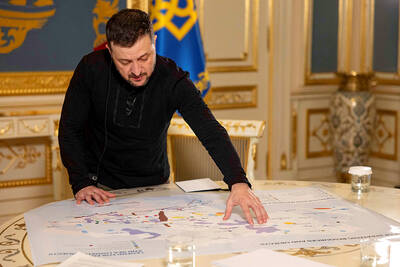Police in southwestern China have detained a writer who was trying to compile a list of children killed in schools that collapsed during a devastating earthquake last year, an activist group said.
In town after town in Sichuan Province, schools collapsed during the May 12 earthquake, in some cases as residential buildings around them stayed standing. Over 80,000 people were killed in the earthquake, but the government has never released the number of children who died.
Tan Zuoren (譚作人) wrote a proposal this year, called “5.12 Student Archive” to ask Web users and people who lost their children in the quake to help set up a detailed database of the victims.
He asked volunteers in the project to also compile any evidence of shoddy construction at the schools.
He was detained on charges of subversion of state policies on March 28, the Information Center for Human Rights and Democracy said.
Calls to his family home were unanswered yesterday.
A Reuters survey based on media reports at the time estimates that just under 10,000 of the victims were schoolchildren.
Tan had previously initiated a campaign to protest against plans by PetroChina to build an oil refinery and petrochemical plant in Pengzhou, near Chengdu, the capital of Sichuan Province.
Hundreds of citizens rallied against the plant, plans for which were shelved after the earthquake flattened large swathes of Pengzhou County.
Police had previously detained other activists pressing for information about the dead schoolchildren, one of whom has been in custody without trial for nine months, the center said.

Thousands gathered across New Zealand yesterday to celebrate the signing of the country’s founding document and some called for an end to government policies that critics say erode the rights promised to the indigenous Maori population. As the sun rose on the dawn service at Waitangi where the Treaty of Waitangi was first signed between the British Crown and Maori chiefs in 1840, some community leaders called on the government to honor promises made 185 years ago. The call was repeated at peaceful rallies that drew several hundred people later in the day. “This government is attacking tangata whenua [indigenous people] on all

RIGHTS FEARS: A protester said Beijing would use the embassy to catch and send Hong Kongers to China, while a lawmaker said Chinese agents had threatened Britons Hundreds of demonstrators on Saturday protested at a site earmarked for Beijing’s controversial new embassy in London over human rights and security concerns. The new embassy — if approved by the British government — would be the “biggest Chinese embassy in Europe,” one lawmaker said earlier. Protester Iona Boswell, a 40-year-old social worker, said there was “no need for a mega embassy here” and that she believed it would be used to facilitate the “harassment of dissidents.” China has for several years been trying to relocate its embassy, currently in the British capital’s upmarket Marylebone district, to the sprawling historic site in the

‘IMPOSSIBLE’: The authors of the study, which was published in an environment journal, said that the findings appeared grim, but that honesty is necessary for change Holding long-term global warming to 2°C — the fallback target of the Paris climate accord — is now “impossible,” according to a new analysis published by leading scientists. Led by renowned climatologist James Hansen, the paper appears in the journal Environment: Science and Policy for Sustainable Development and concludes that Earth’s climate is more sensitive to rising greenhouse gas emissions than previously thought. Compounding the crisis, Hansen and colleagues argued, is a recent decline in sunlight-blocking aerosol pollution from the shipping industry, which had been mitigating some of the warming. An ambitious climate change scenario outlined by the UN’s climate

BACK TO BATTLE: North Korean soldiers have returned to the front lines in Russia’s Kursk region after earlier reports that Moscow had withdrawn them following heavy losses Ukrainian President Volodymyr Zelenskiy on Friday pored over a once-classified map of vast deposits of rare earths and other critical minerals as part of a push to appeal to US President Donald Trump’s penchant for a deal. The US president, whose administration is pressing for a rapid end to Ukraine’s war with Russia, on Monday said he wanted Ukraine to supply the US with rare earths and other minerals in return for financially supporting its war effort. “If we are talking about a deal, then let’s do a deal, we are only for it,” Zelenskiy said, emphasizing Ukraine’s need for security guarantees